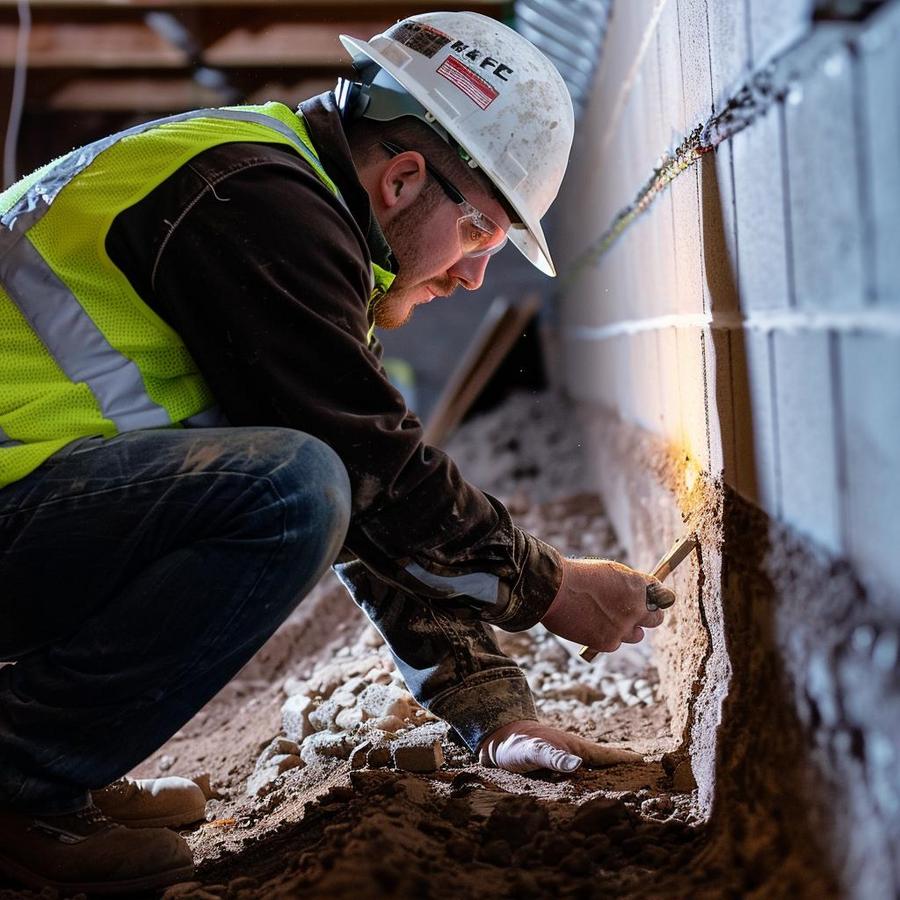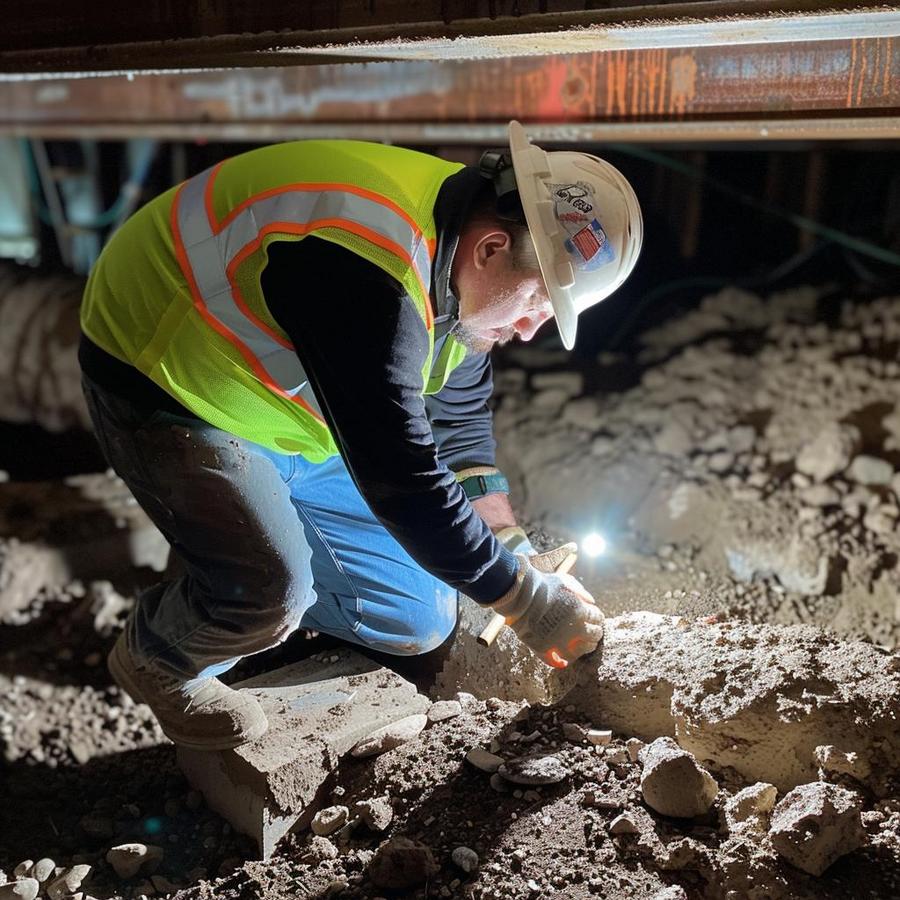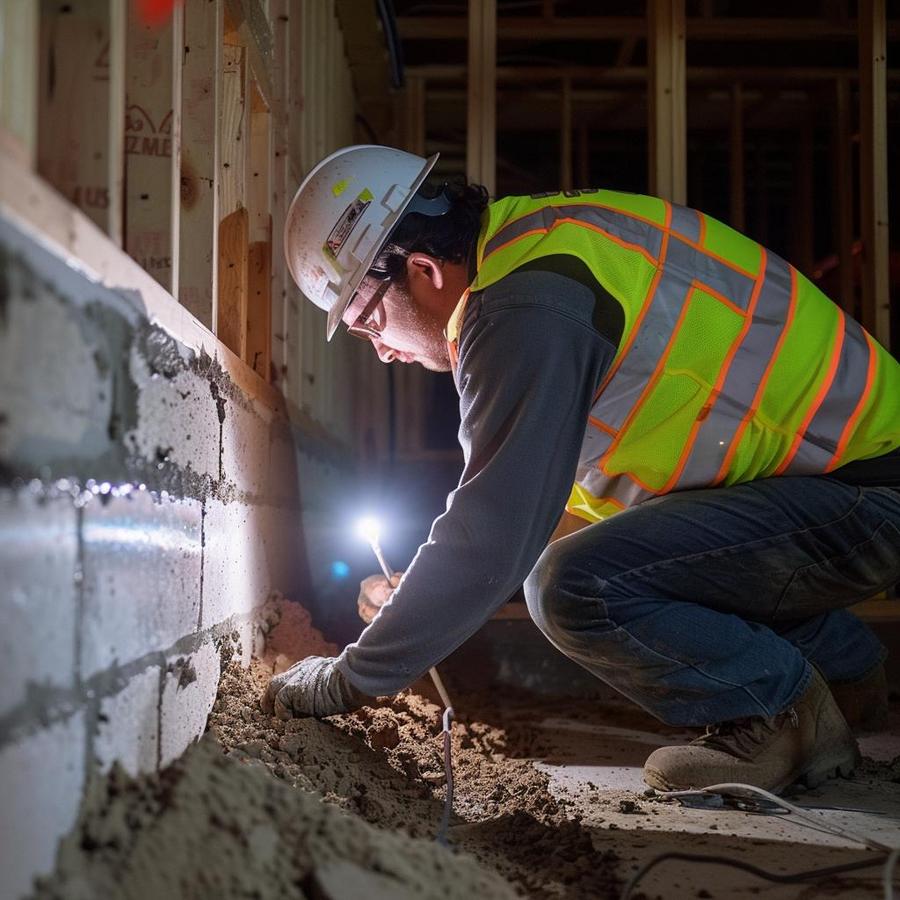Thinking of skipping a foundation inspection? Think again. Every house stands strong on its foundation. But cracks or shifts can mean big trouble. A pro can spot these issues fast. They check your house's base to keep it safe and sound. Don't wait until it's too late. Make sure your home stands firm with a foundation check-up.
TL;DR:
- Professional foundation inspections are crucial for identifying and addressing foundation problems early, preventing expensive repairs.
- Look for reputable inspectors with local expertise, as costs range from $300 to $3,000 based on the house size and depth of inspection.
- Inspections reveal critical issues like cracks, sticking doors, and uneven floors, signaling foundation damage.
- Ideal times for inspections include before purchasing a home, during new constructions, and upon noticing signs of trouble.
- Consult with a certified foundation inspector about potential issues and solutions, emphasizing their experience and the condition of the foundation including the impact of plumbing issues.
- Distinguishing between normal settling and serious foundation problems helps avoid unnecessary expenses, with structural engineers providing detailed analyses.

What Should You Know About Foundation Inspection?
Why is a professional foundation inspection critical?
A good check keeps your house safe. It finds if a fixing is due. You ask, "What makes inspections so key?" They assure you that your house base is strong. A weak base can lead to big troubles like cracks and leaks. These experts look at inside and outside parts. They check the ground and walls around your house too.
How to find a reputable foundation inspector near you?
Look for someone with good training and tools. You can ask friends or check online. Make sure they have proof they can do the work well. It's best if they know about the grounds in your town. You live near the place, you need someone who does too.
What are the expected costs for a foundation inspection?
The cost can start from $300. It depends on how big your house is and how deep the checking goes. A big, old house might cost up to $3,000. But it's worth it. Knowing your foundation is okay can save you money down the road. You won't have big repairs out of the blue.
In all, getting your house’s foundation checked is smart. It spots problems before they get worse. It helps keep your home as a safe place. Always choose a skilled inspector for this important job.
What Are Common Signs of Foundation Problems?
Identifying critical signs of foundation damage
Cracks in your home tell you a lot. Big cracks in your walls and floors point to foundation problems. If your doors stick or won't close right, that's another bad sign. Floors and walls might also look bent or bowed. These issues need quick checking.
The relevance of basement inspections in foundation assessment
A good check of your basement can show foundation issues. Look for water marks and mold. These often mean there are cracks letting water in. A wet basement can ruin your home's base fast.
Understanding the distinction between structural concerns and minor issues
Small, hair-line cracks in your foundation might not be a big worry. They happen as a house settles. But big gaps, especially ones that get wider at one end, can mean serious damage. Knowing what's minor and what's not keeps your house safe and saves you from big repair bills.
For more detailed info on foundation inspections, check this detailed guide on Forbes.
Related Links:
–Sell My House Fast Greensboro: Cash Offer Guide

How Is a Foundation Inspection Conducted?
The integral steps in a professional foundation inspection process
First, a licensed foundation inspector checks outside your home. They look for cracks, dips, or bowing in the foundation. They use a foundation inspection tool to measure the severity of any damage.
Essential tools used by foundation inspectors
Inspectors carry tools like levels, measuring tapes, and crack gauges. These help them assess how even your floors are and the width of foundation cracks.
The role of licensed inspectors in conducting thorough evaluations
Licensed inspectors also inspect your home's inside. They look for signs that might not be obvious from outside. For example, they check for interior wall cracks and uneven floors. They also examine plumbing for leakage that could affect the foundation’s health.
A typical foundation inspection takes about two hours but can vary with your home's size and issues. Costs start at around $300, but more complex inspections could be up to $3000.
It is crucial to have an inspection if you're buying a house or see signs of foundation trouble. Always ask your inspector about their experience and any major concerns they find.
This thorough check helps you understand your home's foundation condition. You'll know if immediate fixes are needed or if you can plan repairs for later.
When Is the Best Time to Get a Foundation Inspection?
Identify the best times for a foundation inspection. It's crucial when buying a home or seeing signs of trouble.
Identifying the ideal moments for a foundation inspection
The best time for a foundation inspection is before you buy a house. This ensures you know what issues may exist before you commit. For new homes, a pre pour foundation inspection is essential. This checks the base before the concrete is poured.
The importance of foundation inspection for new construction
New constructions need foundation checks to prevent future problems. It ensures the ground and base structures are stable and prepared for building. Skipping this can lead to severe issues and high costs later.
Foundation inspections during real estate transactions
During any home sale, get a foundation check. This finds any problems that could drop the home’s value or need costly repairs. Insight from a qualified professional such as a structural engineer provides peace of mind.
Understanding these key moments for foundation inspections helps you make informed decisions. Whether managing new builds or purchasing existing properties, these checks ensure safety and investment protection. Scheduling regular checks also catches issues early, making repairs less costly. Ensure to consult with experts who offer detailed, professional foundation inspection services.

What to Ask Your Foundation Inspector?
Qualifications and experience: Ensuring a credible inspection
A certified foundation inspector is a must. They need deep experience in spotting issues that matter. A reliable inspection can save you tons of trouble down the line.
Understanding the foundation's condition: Key areas of focus
Ask your inspector about any clear signs of trouble. Look for cracks, bowing, or dips that point to foundation problems. Also, check inside for any cracks in walls or floors.
Temporary versus long-term solutions: Strategic advice for homeowners
It's not just about finding problems. You must know if a fix is a short patch or a long fix. This helps plan your budget and future home safety steps. Learn also about typical foundation repair costs to gauge potential expenses.
Remember, a good inspector answers all these clearly. Their insight guides critical decisions about your home's health. Always pick an inspector with the right skills and knowledge to trust. Their advice might just be the key to securing your home's future stability and safety.
How to Differentiate Between Settling and Foundation Problems?
Settling is part of any home's aging process. However, not all signs of movement mean serious foundation issues. So, how do you know the difference? Typically, minor wall cracks or door misalignments from settling are less severe and happen as materials expand and shrink over seasons. On the other hand, foundation problems involve bigger, more distinct signs like large wall cracks, floors that slope, and doors that won't shut correctly.
For house owners in places like Denton, it's important to find experts in house leveling and foundation repair near me who can offer precise assessments. Consulting with a structural engineer for foundation inspection can provide a detailed analysis of the situation. These pros inspect your home both inside and out, keeping an eye on not just the obvious issues but also less visible ones like disruptions in plumbing and wall alignment.
Now, what makes consulting a structural engineer beneficial? Beyond their ability to detect serious flaws, they bring expertise in determining whether issues are due to natural settling or actual foundation problems, which could save you considerable amounts in unnecessary repairs. For example, while some cracks in walls might seem alarming, they might merely be superficial and not demand immediate action.
Lastly, about foundation settling misconceptions: not all signs point to doom! Some homeowners panic upon seeing minor cracks or a slightly sticky door. But remember, these can be normal and not necessarily a call for urgent and expensive fixes. An expert can help walk you through what is worth worrying about and what can wait, balancing safety with practicality. Establishing this difference, especially through professional consultation, keeps your home safe without overstretching your budget.

Understanding the Impact of Plumbing on Foundation Integrity
The connection between plumbing issues and foundation damage
Plumbing problems can hurt your foundation. Leaks make the soil expand and push up against the foundation. This can cause cracks and harm your home's structure. Most homes have this risk.
Insightful methods for detecting plumbing-related foundation problems
First, check for water puddles or damp ground around your home. These can point to leaks. Inside, look for cracks in walls or floors. These often signal foundation shifts from plumbing issues. Listen for sounds of running water even when all taps are off. This could mean hidden leaks hurting your foundation.
Protocols for inspecting foundations with slab and crawl space configurations
For a slab foundation, inspectors focus on surface level changes and cracks. They look for uneven flooring and doors that won't close right. In crawl spaces, inspectors check for dampness, mold, or wood that's breaking down. These signs can tell if water from leaks is causing trouble.
Foundation inspections are key in spotting these problems early. They can save you a lot from costly repairs later. Always ask for a thorough check of plumbing when getting a foundation inspection. This simple step can keep your home safe and sound.
We covered why and how to check your home's base, signs of trouble, and key inspection steps. Always ask pros the right questions and know the difference between settling and real problems. Plumbing's role is big too. In short, for peace of mind and a safe house, get experts to look at your foundation. It's smart and saves you a lot in the long run.











